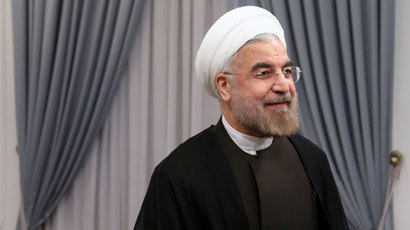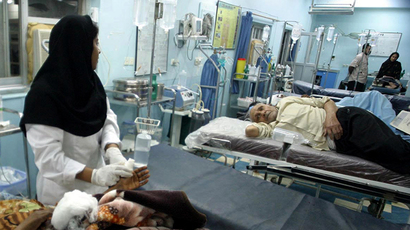Rouhani acknowledges Holocaust, dismisses nuclear threat accusations
Iranian President Hassan Rouhani, who is attending the UN General Assembly, has publicly acknowledged Nazi crimes against Jews. His speech at the UN focused on Tehran’s nuclear program and sources of violence in the Middle East.
The acknowledgement of the Holocaust came in an interview Tuesday evening the new Iranian president gave to CNN.
"I am not a historian and when it comes to speaking of the dimensions of the Holocaust it is the historians that should reflect," Rouhani told CNN. "But in general I can tell you that any crime that happens in history against humanity, including the crime the Nazis created towards the Jews, is reprehensible and condemnable.”
Rouhani’s words differentiate him markedly from his predecessor Mahmoud Ahmadinejad, who on several occasions publicly denied that the Holocaust ever happened. It was the latest in a series of his moves, which are apparently aimed at reducing tensions between Iran and Israel.
The Iranian president’s speech at the General Assembly was less surprising. Rouhani stated that nuclear weapons and weapons of mass destruction have no place in Iran’s security doctrine in a sweeping speech, which also condemned the use of drones in the Middle East, as well as the enforcement of harmful and “violent” sanctions on Tehran.
"These sanctions are violent, pure and simple," he told the assembly, comparing them to the punitive measures against Iraq under late Saddam Hussein rule. "The negative impact is not nearly limited to the intended victims of sanctions," which means normal people, not political elites, ended up suffering because of these sanctions, Rouhani added.
The Iranian leader also addressed President Obama’s earlier UN address, and expressed hope for implementing a framework to manage relations with the US while expecting a “consistent voice” from Washington.
‘Iran seeks to resolve problems, not to create them’
Rouhani also indicated that his country was ready to immediately engage in result-oriented talks over its nuclear program, which Israel has consistently believed to be aimed at producing weapons.
“Nuclear weapons and other weapons of mass destruction have no place in Iran's security and defense doctrine, and contradict our fundamental religious and ethical convictions,” Rouhani said, adding that it’s in Iran’s national interest to remove “any and all reasonable concerns about Iran's peaceful nuclear program.”
But that objective, he said, cannot be reached without “acceptance of and respect for the implementation of the right to enrichment inside Iran and enjoyment of other related nuclear rights.” It is “unrealistic” to believe that the “peaceful nature” of Iran’s nuclear program – which has already reached “industrial scale” – can be “ensured through impeding the program via illegitimate pressures.”
Among other topics touched on by the Iranian President in an often accusatory speech was the alleged "assassination" of his country's nuclear scientists. “For what crimes have they been assassinated? The United Nations and the Security Council should answer the question: have the perpetrators been condemned?”
Despite what some analysts believe has been a marked change in Iran's posturing since the election of Rouhani, who is thought to be more of a reformist than his predecessor Mahmoud Ahmadinejad, Israel largely signaled its rejection, with the country's delegation walking out of the UN chambers during the Iranian President's address, as has been the custom in prior UN General Assemblies.
Israeli Prime Minister Benjamin Netanyahu has openly dismissed Iran’s newly conciliatory stance on its nuclear program, labeling it as a ruse designed to buy the Islamic Republic more time.
"Iran thinks that soothing words and token actions will enable it to continue on its path to the bomb," Netanyahu told reporters in New York.
On Tuesday rumors had swirled that the Iranian leader might meet
with his American counterpart, though hopes for such a high level
encounter were dashed after statements made by White House
officials, who said that the Iranian delegation responded that
such an encounter would be “too complicated."
‘Nowhere in the world has violence been so deadly and destructive as in North Africa and West Asia’
The human tragedy in Syria represents a painful example of catastrophic spread of violence and extremism in the region, Rouhani noted.
“From the very outset of the crisis and when some regional and international actors helped to militarize the situation through infusion of arms and intelligence into the country and active support of extremist groups, we emphasized that there was no military solution to the Syrian crisis. Pursuit of expansionist strategies and objectives and attempts to change the regional balance through proxies cannot be camouflaged behind humanitarian rhetoric.”
Rouhani also touched the topic of “structural violence” against Palestinian people.
“Apartheid as a concept can hardly describe the crimes and the institutionalized aggression against the innocent Palestinian people,” he said.
‘Military option on the table’ – illegal and ineffective contention
Rouhani called for the UN to enact an environment in which peace would prevail over what he termed coalitions for war, likely in reference to ongoing conflict over Iran’s nuclear program.
“Securing peace and democracy and ensuring the legitimate rights of all countries in the world, including in the Middle East, cannot – and will not – be realized through militarism,” Rouhani said.
Although terrorism is “a violent scourge and knows no country or national borders,” Rouhani said the violence and extreme actions “such as the use of drones against innocent people in the name of combating terrorism should also be condemned.”
People all over the world are “tired of war,” Iranian leader said, inviting the world leaders, international organizations and civil institutions to join the World Against Violence and Extremism project.














